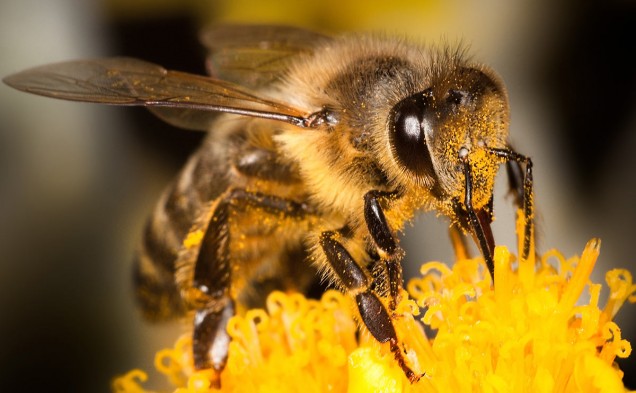Bees are Dying …. Massachusetts Should Pass Pesticide Restrictions
We need honeybees, desperately. Unfortunately, bees are dying at an unsustainable rate; without them, our agricultural system would collapse. Bees pollinize about one third of the food we eat, and about 85% of the world’s crops. Without bees, many essential crops would die out, creating a crisis. In Massachusetts, we rely on bees to pollinate crops on almost half of our farmland. Pesticides are one factor causing the decline in bees; over the last decade, an average of 30% of bee colonies die every winter in the United States. Bees are also dying in the wild.
In this article I will briefly give an introduction on neonicotinoids (popularly called “neonics”) a specific type of pesticide. I will then explain the current regulations on pesticides in Massachusetts, and summarize the proposed legislation directed at neonics. Finally, I will outline similar legislation in other states. Based on the evidence, the Legislature should take action and enact House Bill 655.
Most pesticides are capable of killing bees, however one type- neonics- is particularly lethal. These pesticides became popular because they are safer for people and animals than other pesticides. Neonics are also particularly effective as a pesticide, because they target specific types of insects and move throughout entire plants’ vascular systems, distributing the chemical to all parts of the plant, including the nectar and pollen. Bees can ingest the pesticide in a number of ways. Once neonics are applied to the seeds, the ground, or the leaves of the crop, bees may ingest the pesticide by drinking nectar, transferring pollen, or by flying through clouds of the pesticide (a result of spraying neonics on the ground or leaves. The pesticide causes the bees to become disoriented. They leave their hives and are not able to return, causing them to die without the support of the hive.
One way to reduce bee mortality is reduction of the use of neonics on crops. Italy banned the use of the pesticide on corn crops in 2008. Researchers found that crop yields did not decrease as a result of stopping the pesticide use. In a study in Ontario, farmers reported that the use of pesticides only minimally increased crop yields, and that they could have better success increasing yields by improving irrigation techniques and improving the quality of their soil. However, the agro-chemical industry claims that banning neonics would cause agriculture to suffer and result in crop failure.
The decline of bees poses problems not only for agriculture, but also to the beekeepers that care for them. During the 2014-2015 growing seasons, American beekeepers lost an average of 42% of their colonies. Massachusetts beekeepers lost 46.4% of their colonies from 2014 to 2015.
Beekeepers cannot bring their bees to pollinate on land where the farmers heavily spray neonics without risking losing the majority of their colonies. Further, because the neonics absorb into pollen, the dangerous effects travel beyond the plants that were initially treated. Thus, beekeepers are being seriously limited as to where they can pollinate their bees without threatening their livelihood.
Current Regulations in Massachusetts
Massachusetts regulates pesticides under the Massachusetts Pesticide Control Act (MPCA, M.G.L. 132B). The MPCA defines pesticides as “a substance or mixture of substances intended for preventing, destroying, repelling, or mitigating any pest, and any substance or mixture of substances intended for use as a plant regulator, defoliant or desiccant (M.G.L. 132B §2). In its current form, the MPCA does not specifically regulate neonicotinoids separately from other types of pesticides.
The MPCA does not limit pesticide use during the blooming season in any way. The MPCA does, however, state that the Department of Food and Agriculture shall promote alternate pest control methods, such as integrated pest management and sustainable agriculture.
Proposed Regulations
There is currently a bill in Massachusetts that would impose a partial ban on neonics. The bill is currently in the Environment, Natural Resources and Agriculture Committee and would limit the use of neonics to use by certified applicators. During the blooming season, the bill would prohibit consumer (non commercial) use. Outside of the blooming season, neonics can be used for both commercial and non-commercial purposes, but only if applied by a certified applicator.
The bill would require commercial applicators to provide landowners with lists of alternative, less harmful pesticides, and require the applicators to inform landowners of the risks involved with using the pesticide. The bill would further require landowners to acknowledge that they understand the risks involved. Finally, the bill would require that certified commercial applicators complete training programs on the risks of neonics and the proper application techniques to reduce those risks.
Similar Regulations in Other States and Countries
In April 2016, Maryland became the first state to impose major restrictions on neonics use, with a partial ban taking effect in January 2018. Maryland’s act allows farmers to apply the pesticide to their crops, but will ban regular consumers from purchasing the pesticide for home use.
Oregon also regulating neonics, but only bans neonic use on one genus of tree. Eugene, Oregon has taken the ban one step further and banned neonics use on city owned land. Seattle has also banned the pesticide on city owned land.
Outside of the United States, Italy implemented a partial ban on neonic application to seeds and the ground in 2008. Five years after the ban was initiated, researchers noticed a significant improvement in the quantity of bees and colonies. However, the researchers noticed that bee mortality rates remained high in areas where plants’ leaves (as opposed to their seeds or the ground) are treated by the pesticide. In 2013 the EU implemented a temporary restriction on the use of neonics by prohibiting their use on crops “attractive to bees”. Additionally, France is moving toward a total ban on pesticides that can harm bees.
Areas of Concern
Farmers are hesitant about heavy regulations on neonics because they fear reduction in crop yields and increased costs. They’re right to fear increased costs- when the UK banned neonics on rapeseed crops, farmers faced an additional $33 million in costs for alternative pesticide use, replanting, and lost crops. Unlike the ban in the UK, House Bill 655 would not prohibit commercial farmers from using the pesticide on their crops.
The Massachusetts Legislature should pass H. 655—although the bill does not outright ban the use of neonics, any new regulation is a step in the right direction. If crop growers are educated on the harmful effects to bees from the pesticides they are applying, they may opt for alternative methods. Further, restricting the use of neonics to commercial use will eliminate their use by individuals, protecting bees in the wild (as opposed to bees managed by beekeepers). So far, no states in the United States have totally banned the use of neonics, and Massachusetts is unlikely to be the first. However, by limiting the use of the pesticide, and giving its effects a hard look, we may pave the way for more pollinator friendly legislation.
Talia Quartetti



